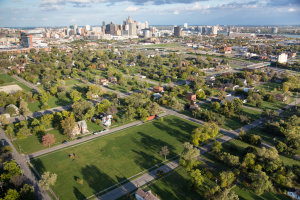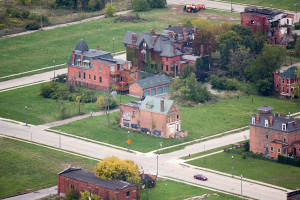Be Glad you don’t Own in Detroit
. Posted in News - 0 Comments
Massachusetts "Gateway Cities" are Relative Paradises
The Commonwealth of Massachusetts has labeled some post-industrial cities like Springfield, Worcester, Lowell, and Lawrence as "gateway cities." At the time this was a nice way of saying the future lay beyond their current depressed state.
But nothing compares with the post-industrial wreckage of what once was America's most vibrant city, Detroit. The city's population peaked in 1950 at almost 2 million souls, with infrastructure and sprawl to match. Now sixty years later the population is less than half of what it was, with 700,000 hangers-on. The city owns 84,000 foreclosed buildings, thousands of which are occupied by illegal squatters. There are serious efforts underway to bulldoze another quarter of this once great metropolis.
Much of the city has already been demolished. The hangers on have taken to burning down neighboring buildings to eliminate squatters and other undesirable situations. According to Wikipedia, there are 23 building fires in Detroit every day, and fully 95% of these fires are caused by arson. Arson! Imagine burning down the house next door because it displeases you, because you can.
Due to the same budgetary pressure that caused the city to collapse, these fires are never investigated. The fire department's goal is merely to save the squatters, if necessary, and prevent the fire from spreading to adjacent buildings. You can burn your abandoned neighborhood with impunity. Finally, that view you've always wanted is within reach!
Those who remain in Detroit are fiercely loyal to their home city and will no doubt turn it around. As evidence of this we share some pictures from a New York Times article, "Detroit From the Air." Grassy fields and community farms now appear where vacant buildings recently stood rotting.
Detroit's decline serves as a warning to all who would work in government that the engine of civic prosperity is a competitive local economy. Decisions to tax certain behaviors, increase minimum wages, or impose regulatory burdens must now always be viewed in the broader global context. Because if some other place doesn't tax and burden the way you do, your civic engine may just move out of town. Perhaps American automotive manufacturing could not have been saved wholesale from the likes of Toyota. But certainly city officials should have been aware of this trend and working to mitigate its impact through diversification of local talent.
Detroit is also a warning to civic minded individuals to be wary of government corruption. MyFOXDetroit reports that over the last 80 years, five Detroit mayors and four county executives were either removed from office, sent to prison, or federally investigated for ties to the mob. The city's slide toward bankruptcy was apparently hastened by incompetence concerning their pension fund and capital expenditures.
Always remember that if you see a problem, you may be the only person to notice it. Please say something to someone. We can avoid the mistakes of those who've gone before us. A lot of little nudges can start even the biggest boulder rolling in a new direction.







